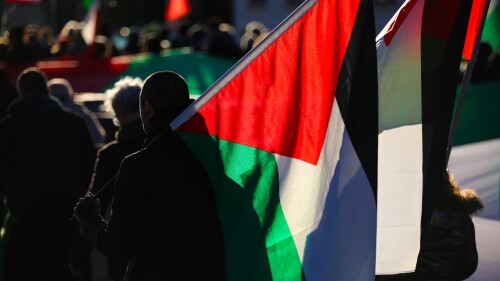On March 10th, the geopolitical reality of the Middle East changed overnight. Years of U.S. dominance in regional affairs, and U.S.-led efforts to isolate Iran and bring Israel and Arab countries closer, suddenly turned the page as Chinese, Saudi, and Iranian diplomats posed for photos in Beijing while announcing the Chinese brokered Saudi-Iranian normalization agreement.
It remains to be seen if Iran is willing to end its regional predatory quest for dominance. But it is clear that the Middle East, and the rest of the world, is entering an era of ambiguity in which the rule-based order remains while other powers are attempting to wrestle it out of U.S. hands.
Two weeks ago, Middle East observers were still talking about the Middle East that is dominated by the U.S. Then, the primary aspiration for U.S. foreign policy was to help U.S. regional allies, namely Israel and Arab countries, to join a U.S.-sponsored security framework through which increased pressure could be applied to isolate Iran and neutralize its threats. Not a week went by without observers speculating on a possible Israeli-Saudi normalization agreement that can completely alter the regional power structure of the Middle East. That Middle East is no more.
Suddenly after March 10th, the tables have turned, and it is Israel and the U.S. now on the outside, looking in.
China and the Middle East in a Multipolar World
The agreement did not settle much, if any, of the standing issues between the two Middle Eastern rivals. Yet, it succeeded in asserting the sovereignty of each and the pledge of noninterference and signaled the resumption of diplomatic exchange between both countries.
The deal signals a new era in international diplomacy in which Chinese economic ties and developmental projects play a major role, maybe even decisive, in international relations in many parts of the world.
This is a remarkable achievement and the first major diplomatic play by China in the multipolar world. That the theater in which China chose to announce its entry to the era of great power diplomacy is the Middle East is unsurprising. Chinese diplomats are the first to caution against speculation and unwarranted optimism. The swift winds which brought such sudden changes in Middle Eastern geopolitical outlooks may blow again sooner than one expects. Moreover, this does not mean that China is planning to intervene in the Middle East on any scale comparable to American or historical Russian involvement. Yet the deal does signal a new era in international diplomacy in which Chinese economic ties and developmental projects play a major role, maybe even decisive, in international relations in many parts of the world.
For the Middle East, this is not choosing China over the West or one ally over another. This is the reconfiguration of regional diplomacy to meet the new order of national and regional priorities in a multipolar era in which the developing world looks up to China for rapid economic development, unrestrained by demands for political reforms. No Chinese officials will be asking about women’s rights or imprisoned bloggers. This is not a pivot from the rules-based order but a pivot within the rules-based order toward the possibility of new rules not being made by the West.
A Convergence of Interests
As with any major move in international relations, outcomes are often the spontaneous result of opportunity, needs, and constraints. The agreement would not have happened if it weren’t for the convergence of broader strategic interests of China, Iran, and Saudi Arabia around the de-escalation of tensions and to supplant the traditional US security-focused geopolitical arrangements with an economic framework for investment-generating developmental agreements.
In this new reality, the more Washington demands its allies decouple from China, the more the U.S. will find itself isolated.
This is the first time this Chinese political model is being tested in the wild in a rough area like the Middle East. Both Saudi Arabia and Iran are the primary source of Chinese energy supply, and both are potential members of BRICS, the economic forum made of non-Western powers in which China is the largest economy. Chinese investments in the energy sector in the Arab Gulf as well as its Belt and Road initiative, make securing such an investment a pressing need. Moreover, China needs to secure its economic foothold in the region and ensure that U.S. allies won’t be able to answer Washington’s call to decouple in a region historically dominated by the U.S. that feels increasingly threatened by China. In this new reality, the more Washington demands its allies decouple from China, the more the U.S. will find itself isolated. Thus, and despite Chinese caution, this agreement comes with big promises for Beijing.
Prince Mohamed bin Salman’s Ambitions
The fact that so many Chinese interests are vested in this agreement is what encouraged Saudi Arabia to test the waters of the Chinese-brokered diplomacy with Iran. Since his rise to power and riding a wave of soaring energy prices leaving large surpluses, Crown Prince Mohamed bin Salman made it known that his single most important priority is his ambitious long-term development plan for Saudi Arabia, which includes economic diversification, industrialization, state-controlled social liberalization, and turning Saudi Arabia to a talent and capital magnet.
Unlike the Iranians, the Saudis do not wish to vie for dominance using rogue militias in war-torn countries suffering from state collapse. Their military co-adventure with the UAE in Yemen showed them they could not produce stability with military force. The presence of an unsympathetic administration in Washington that insists on publicly humiliating Saudi Arabia and left the U.S. ambassador’s role in Riyadh vacant for two years, makes it even more pressing for Saudi Arabia to assert its own independence. Growing competition with the UAE, which is trying to position itself to be Washington’s new Arab favorite, may soon leave the Saudis with less leverage over Arab Gulf-produced oil, which they traditionally exercised through OPEC. This helped channel Saudi strategic thinking into signaling the possibility of a nonaligned camp in which the Saudis will use its crucial role in the region and in energy markets to balance Egypt, Israel, Iran, Qatar, Turkey, and the UAE to protect its interests, security, and influence. This requires the Saudis to restore ties with everyone, including Qatar and Turkey.
The View from Tehran
For Iran, things are more straightforward. For years, the U.S. has been leading a campaign to isolate Iran regionally and internationally. The Abraham Accords, normalization agreements between Israel, UAE, and Morocco, faced Iran with the threatening prospect of a U.S.-led Arab-Israeli anti-Iranian coalition. This would have been Iran’s worst nightmare. Moreover, Western outrage over Iran’s support for Russia in the war in Ukraine and the recent human rights crisis over the criminal treatment of women left Iran internationally humiliated. Domestically, the Iranians are suffering from a tough economic reality and deteriorating living conditions.
Iran needs Chinese investments and ways to break its isolation in the region which may allow for some economic relief. Whether Iran could truly forgo its dreams of regional dominance is a different question. But for the time being, Iran needs friends.
The Regional Context
Unless Washington is willing to offer the Saudis what they want in exchange for normalization with Israel, namely security guarantees and nuclear assistance, Israel is likely to feel increasing regional pressure.
While it is important to put this recent episode of Middle Eastern political intrigue in the context of global competition, regional context is of equal importance. It is the season of remembering old friends and seeking reconnections in the Middle East. Egypt and Turkey, after a decade of bitter conflict due to the latter’s support of the Muslim Brotherhood in the former, even after current sitting Egyptian President Sisi overthrew it, are conducting high-level talks to resume diplomatic relations. Saudi Arabia and the UAE already resumed relations with Turkey last year and are seeking to rehabilitate Erdogan in the region. The Saudis reversed their position on Qatar and ended their blockade, allowing Qatar to seek reconciliation with Egypt and to promise major investments to stimulate the latter’s economy. After being isolated in his fort in Damascus, Bashar Assad was given a full ceremonial welcome in Abu Dhabi, signaling his reentry into the Arab fold. Arab states, led by Jordan, are lobbying Washington to end its sanctions regime against Damascus and to turn the page on the Syrian civil war.
The Iranian-Saudi agreement also promises cooperation to end the conflict in Yemen, help Lebanon out of its political dysfunction, and potentially discuss plans for reconstruction programs in Syria. The Iran agreement is part of this regional effort aiming to find a new workable regional structure and geopolitical formula to allow for more stability, security, and economic development. Yet, it is important to remember this is not the first time in recent memory this has happened. The Saudis and the Iranians had many false starts before. Qatar and Turkey remain in control of key Muslim Brotherhood networks. The local combatants in Yemen may prove less cooperative than thought. Different priorities, new opportunities, and emerging threats may very easily disrupt all the pots currently cooking.
A Setback for Israel
This is a regional setback for Israel that comes at a politically sensitive time. Israel, already under immense domestic and international strain due to the controversial judicial overhaul reforms, is finding itself regionally isolated. Once happily traveling between Abu Dhabi and Sharm al-Sheikh, and looking to travel to Riyadh while the Iranians were on the outside, looking in; the Israelis have now switched sides with the Iranians as the latter travel to Abu Dhabi, Riyadh, and Cairo while Israel is left out.
Moreover, the sudden loss of U.S. leverage in the region will most certainly be felt by Israel. Unless Washington is willing to offer the Saudis what they want in exchange for normalization with Israel, namely security guarantees and nuclear assistance, Israel is likely to feel increasing regional pressure. The UAE, while rolling the red carpet for notorious war criminal Bashar Assad and Iranian diplomats, is already signaling its plans to downgrade diplomatic and security relations with Israel. The UAE almost certainly will maintain strong economic and trade ties with Israel, but it may shift its diplomatic and security weight to normalization with Iran and reinforcement of bilateral relations with China while attempting to curry favor with the West through climate change and sustainability diplomacy.
In this new multipolar world, the rules-based system will remain, but there will be new rules not of our own making.









